British foreign policy 1815 to 1914
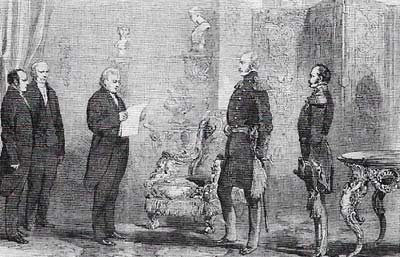
Figure 1. A Quaker deputation led by Joseph Sturgeon on the eve of the Crimean War (1854) paid a special visit to Tsar Nicholas I to plead for peace. This was unofficial, and although the British cabinet was divided on the issue, public opinion clamored for war. Radical MPs who denounced it, including John Bright (1811–1889) and Richard Cobden (1804–1865), lost their seats at the election of 1857, in which Palmerston was safely returned.
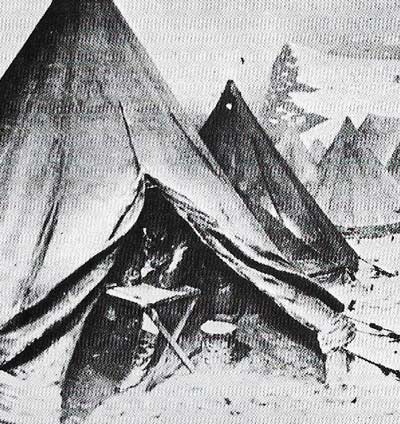
Figure 2. The Crimean War revealed the inefficiency of the army's organization and command, more soldiers died from disease than in battle. William Russell (1820–1907) reported the chaos in The Times.
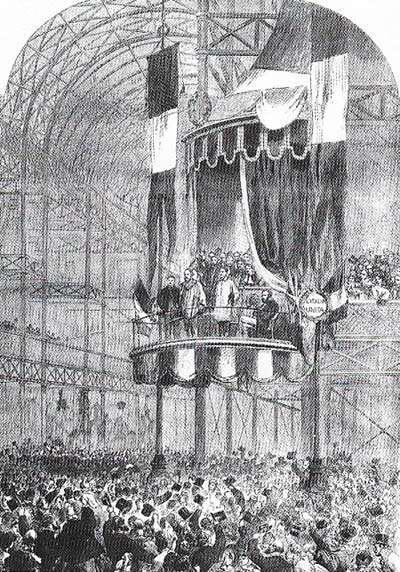
Figure 3. Giuseppe Garibaldi (1807–1882), the Italian nationalist leader, visited London in 1864 and received a great welcome, addressing crowds of 20,000 at the Crystal Palace. Several other Continental revolutionaries and nationalists had a similar reception, including the Hungarian Louis Kossuth (1802–1894), who fled to England after the Russians had invaded Hungary following Kossuth's proclamation of Hungarian independence from the Hapsburgs early in 1849. Despite his dubious political ambitions, Kossuth was entertained by the foreign secretary, Palmerston. Support for Continental nationalist movements was a potent force in domestic politics in the 19th century; sympathy for the Italians' struggle against the Austrians took Gladstone, who had previously been a Conservative, into the Liberal Party in 1859. Garibaldi's visit to London in 1864 quickened the demand for parliamentary reform; this was met in 1867.

Figure 4. The British navy was the basis of the nation's power throughout the century. But the overwhelming victory at Trafalgar meant that the Navy did not need to be large to maintain its ascendancy. It was only with the introduction of steam-driven battleships in the 1880s that the start of the naval building race with Germany that the navy again employed as many men as in the time of Nelson.
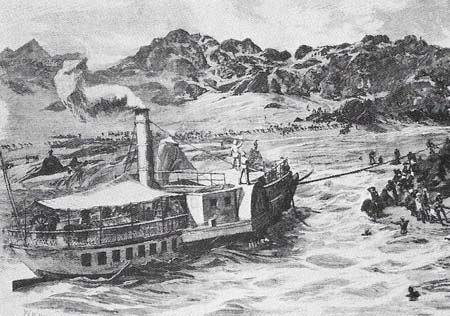
Figure 5. The use of gunboats to quell local disturbances throughout the world, as in this expedition of the Nile to relieve Khartoum in 1884, was typical of the Pax Britannica as maintained by Palmerston.
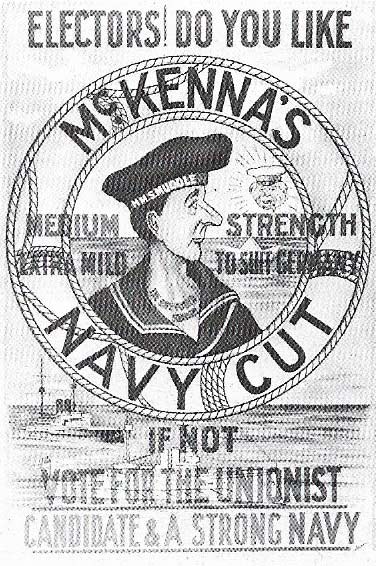
Figure 6. Naval strength was an important issue in the election of 1910, as this poster shows. HMS Dreadnought first of a powerful new class of battleship, was completed in 1906.
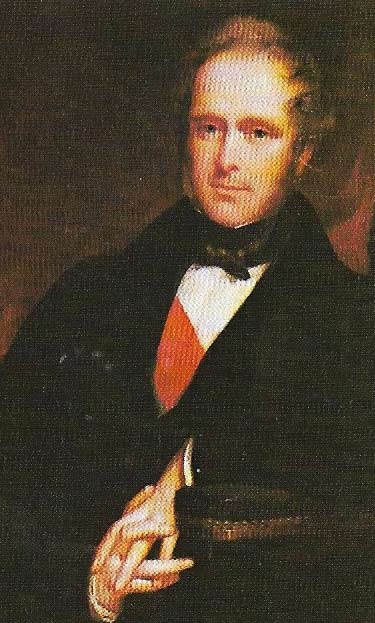
Figure 7. Viscount Palmerston (1784–1865) presided over British foreign policy longer than any other man in modern history. As foreign secretary (1830–1841, 1846–1851) and prime minister (1855–1858, 1859–1865), his policy rested on confidence in the global preeminence of mid-Victorian Britain. His forthright defense of British interests was expressed in the Don Pacifico debate (1850), when he used warships to protect a British citizen against the Greek government, and defended himself with the phrase "Civis Brittanicus sum" (I am a citizen of Britain), echoing the "Civis Romanus sum" of Imperial Rome. From that day until his death Palmerston was a national hero.
The years between the final British victory over the French at Waterloo in 1815 and the outbreak of European war in 1914 are known by the British as the Pax Britannica. They were not years in which Britain was entirely free from war, but, defended around the globe by the world's most powerful navy, it faced no direct threat to its security. During this period, Britain's foreign secretaries played upon a world stage, able to take an enlarged view of their duties and so to weave into their strategic considerations matters of very wide political import.
Protecting free trade and the empire
For most of the century Britain was able to conduct its foreign affairs with mere deference to the views of other powers. Britain's main strategic aims were to protect the empire, in particular the trade route to India, and to maintain the balance of power in Europe. Liberal statesmen tried to encourage the progress of liberal nationalist movements in various parts of the world. But in general, foreign secretaries did not interfere in foreign disputes.
Britain was, of course, favorably placed by the conquests of the eighteenth century and the strength of the navy (Figure 4) to look upon the world as its oyster. The idea of free trade came to dominate not only the Exchequer, but also the Foreign Office. British statesmen considered the world as a place in which all nations, freely trading with one another, would learn that commercial interdependence had made war obsolete as an instrument of national policy.
Only as a result of mounting fear of Russian influence in the Mediterranean did Britain intervene in the war of Greek independence in the 1820s and the Turko-Russian quarrel that led to the Crimean War (1854–1856) (Figures 1 and 2). The nascent power of Russia and the debility of Turkey, the "sick man of Europe", were eventually to turn the Balkans into a powder keg. For a century the "Eastern question" smoldered.
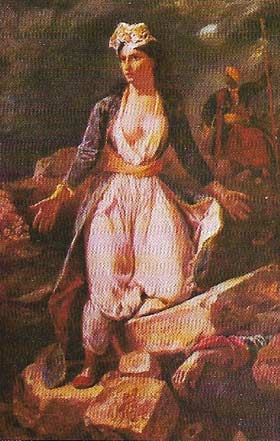 |
| The revolt of the Greeks, epitomized in this painting by Delacroix, was the first liberal cause of the century that took England away from the alliance that had defeated Napoleon. Whereas Austria and Russia opposed Greek freedom, Castlereagh and Canning supported the revolt, and English sympathizers went to fight for the Greeks against the Turks – among them the poet Byron (1788–1824), who died there. |
British liberalism abroad
The tendencies of the age were revealed in the 1820s, during the foreign secretaryships of Viscount Castlereagh (1769–1822) and George Canning (1770–1827). Their main achievement was to disengage Britain from the conservative Holy Alliance of the despotic northern powers – Prussia, Austria, and Russia. At the Congress of Verona (1822) Britain refused to support intervention in Spain to put down the liberal constitutional government that had toppled the Spanish Bourbons. Nor would it aid the "reactionary" cause in Sicily and Portugal. In Latin America Canning gave his blessing and recognition to the revolts against Spanish and Portuguese rule that ended in the establishment of the independent nations throughout the continent. Canning also lent his support to the Greek patriots who fought to gain their independence from the Ottoman Turks. He died two months before the British navy destroyed the Turkish and Egyptian fleets off Navarino (Pilos, Greece) in October 1827, but in 1830 Greece became a fully independent nation.
In that year Palmerston began his first stint at the Foreign Office (1830–1841), during which his most notable achievement was to assist Belgium to win independence from the Netherlands. (British guarantees to Belgium had fateful consequences in 1914). In the East, Palmerston sought to uphold the territorial rights of Turkey. For a time peace was maintained, but in 1854 Russia and Turkey went to war and Britain and France entered on the side of Turkey.
The Crimean War and after
The Crimean War was ostensibly about the tsar's claim to protect Christians under Turkish rule in Europe; in fact it was about whether Turkey should maintain its empire in Europe as a bulwark against Russian aggrandizement in the Balkans. The British army suffered terrible losses, but, in the end, Constantinople and the Black Sea were preserved from Russian control.
Twenty years later, when Turkish misrule in Bulgaria threatened war once more, Benjamin Disraeli (1804–1881) went to the Congress of Berlin (1878) and brought back "peace with honor". The status quo was upheld without war, but Turkey's failure to learn the lesson and put its house in order and the rising appeal of Slav nationalism throughout the Balkans was a bleak omen.
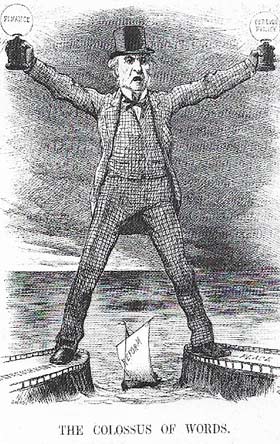 |
| William Ewart Gladstone (1809–1898) is depicted here as the "Colossus of Words", whose policies of peace and liberalism serve as an inspiration for reform at home. His stirring opposition to the Bulgarian atrocities of 1876, when the Turks violently put down a nationalist revolt, was typical of the high moral tone of his political feelings, and led to his overthrow of the Conservative government four years later. |
By the 1880s British security was being undermined. The scramble by European powers for colonies in Africa had begun and in 1882 Britain occupied Egypt. Germany was cutting into Britain's trading and manufacturing supremacy, and was politically worrying France. At the end of Victoria's reign, Germany started building up its naval strength.
As the German threat grew, fears of Russia receded. The Foreign Office was led to recast its priorities, and "splendid isolation" became a thing of the past. In 1904 Edward VII's diplomacy was instrumental in securing the Entente Cordiale with France. There were many people, among them Joseph Chamberlain (1836–1914), who hankered after a German partnership, but the current was flowing in the opposite direction. France was the ally of Russia and in 1907 Britain joined them in the Triple Entente. In 1908, when Bosnia-Hercegovina was annexed by Germany's ally, Austria-Hungary, against the wishes of Russia, the ground was prepared for World War I.
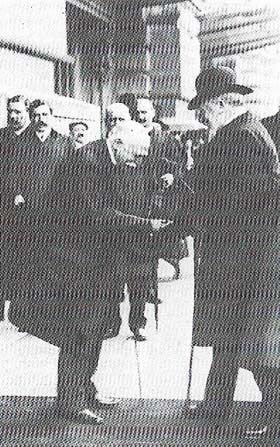 |
| Edward VII's visit to Paris in 1903, and his meeting with the French foreign secretary, won him great affection from the French. It also paved the way to the signing of the Entente Cordiale in 1904, so ending the enmity between the nations. |
